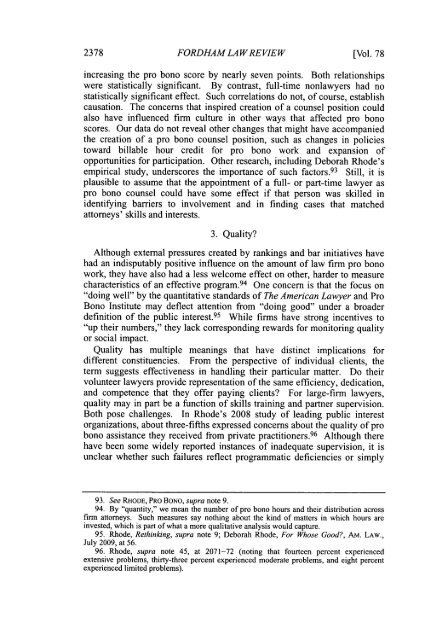Law for The Poor
Law for The Poor
Law for The Poor
You also want an ePaper? Increase the reach of your titles
YUMPU automatically turns print PDFs into web optimized ePapers that Google loves.
2378 FORDHAMLAWREVIEW<br />
[Vol. 78<br />
increasing the pro bono score by nearly seven points. Both relationships<br />
were statistically significant. By contrast, full-time nonlawyers had no<br />
statistically significant effect. Such correlations do not, of course, establish<br />
causation. <strong>The</strong> concerns that inspired creation of a counsel position could<br />
also have influenced firm culture in other ways that affected pro bono<br />
scores. Our data do not reveal other changes that might have accompanied<br />
the creation of a pro bono counsel position, such as changes in policies<br />
toward billable hour credit <strong>for</strong> pro bono work and expansion of<br />
opportunities <strong>for</strong> participation. Other research, including Deborah Rhode's<br />
empirical study, underscores the importance of such factors. 93 Still, it is<br />
plausible to assume that the appointment of a full- or part-time lawyer as<br />
pro bono counsel could have some effect if that person was skilled in<br />
identifying barriers to involvement and in finding cases that matched<br />
attorneys' skills and interests.<br />
3. Quality?<br />
Although external pressures created by rankings and bar initiatives have<br />
had an indisputably positive influence on the amount of law firm pro bono<br />
work, they have also had a less welcome effect on other, harder to measure<br />
characteristics of an effective program. 94 One concern is that the focus on<br />
"doing well" by the quantitative standards of <strong>The</strong> American <strong>Law</strong>yer and Pro<br />
Bono Institute may deflect attention from "doing good" under a broader<br />
definition of the public interest. 95 While firms have strong incentives to<br />
"up their numbers," they lack corresponding rewards <strong>for</strong> monitoring quality<br />
or social impact.<br />
Quality has multiple meanings that have distinct implications <strong>for</strong><br />
different constituencies. From the perspective of individual clients, the<br />
term suggests effectiveness in handling their particular matter. Do their<br />
volunteer lawyers provide representation of the same efficiency, dedication,<br />
and competence that they offer paying clients? For large-firm lawyers,<br />
quality may in part be a function of skills training and partner supervision.<br />
Both pose challenges. In Rhode's 2008 study of leading public interest<br />
organizations, about three-fifths expressed concerns about the quality of pro<br />
bono assistance they received from private practitioners. 96 Although there<br />
have been some widely reported instances of inadequate supervision, it is<br />
unclear whether such failures reflect programmatic deficiencies or simply<br />
93. See RHODE, PRO BONO, supra note 9.<br />
94. By "quantity," we mean the number of pro bono hours and their distribution across<br />
firm attorneys. Such measures say nothing about the kind of matters in which hours are<br />
invested, which is part of what a more qualitative analysis would capture.<br />
95. Rhode, Rethinking, supra note 9; Deborah Rhode, For Whose Good?, AM. LAW.,<br />
July 2009, at 56.<br />
96. Rhode, supra note 45, at 2071-72 (noting that fourteen percent experienced<br />
extensive problems, thirty-three percent experienced moderate problems, and eight percent<br />
experienced limited problems).

















